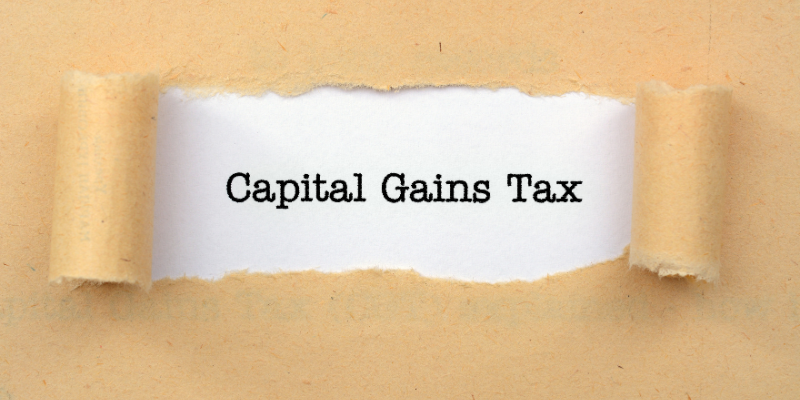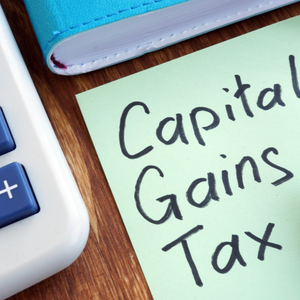
After all the effort of preparing, staging, and negotiating, you’ve finally found the right buyer and agreed on a fair price, but don’t assume the full amount is yours to keep. Many sellers underestimate how much taxes, especially capital gains taxes, can reduce their profits, with both federal and Washington, D.C. taxes potentially applying. Understanding these tax obligations ahead of time can help you plan wisely and keep more of what your home is truly worth.
Understanding Capital Gains
Capital gains refer to the profit made when an asset increases in value and is sold for more than its purchase price. This profit is subject to a tax known as capital gains tax, which applies to various types of assets, including real estate, stocks, and other investments.
In real estate, a capital gain is calculated by subtracting your adjusted cost basis (which includes the original purchase price plus certain expenses and improvements) from the sale price. The gain is unrealized until the property is actually sold, and at that point,t it becomes realized capital gain and is potentially subject to tax.
For example: If you purchased a home for $500,000 and its market value increases to $800,000, you have an unrealized capital gain of $300,000. Once you sell the home at that higher price, the gain becomes realized and it may be taxed as part of your income.
Also, you can experience a capital loss, which happens when you sell an asset for less than what you paid for it. In this case, instead of gaining value, the asset has a loss.
How Much Do You Pay On Capital Gains Tax?
Taxes can be complicated, and capital gains tax is no exception. Since the U.S. uses a progressive tax system, several factors can influence how much you owe.
In general, your capital gains tax rate depends on:
- Your income tax bracket
- The type of asset sold (in this case, your property)
- The amount of taxable realized gain
- The length of time you’ve owned the asset (short or long-term capital gains tax)
- What tax exclusions and benefits are you eligible for
- Whether your gains are taxed at both a federal and state level
There are many tools and resources online that can help you estimate how much you might owe, giving you a rough ballpark so you know what to expect and can make informed decisions about your home sale, especially if you’re planning to sell your home for cash in Glen Burnie or nearby cities. However, to get an accurate number, it’s best to consult a licensed tax professional.
Short-Term vs. Long-Term Capital Gains Tax

There are a lot of things to consider before selling an asset, and it’s not just about whether you’ve made a profit. How long you’ve held the asset matters, too. Understanding the difference between short-term and long-term capital gains tax can help you make smarter, more strategic financial decisions. In fact, simply holding an asset longer can come with some serious tax advantages.
There are two main types of capital gains tax: short-term and long-term.
Short-Term Capital Gains Tax
Short-term capital gains apply when you sell an asset that you’ve owned for one year or less. These gains do not qualify for special tax treatment and are taxed as ordinary income.
This means that any profit (realised gain) from the sale is added to your taxable income and taxed at your regular income tax rate, which can range from 10%-37%, depending on your income level and filing status.
Therefore, it’s less beneficial to sell shortly-owned assets as they do not qualify for the tax benefits of long term assets.
Long-Term Capital Gains Tax
Long-term capital gains are profits from the sale of assets you’ve held for more than one year. These are taxed at preferential rates, which are generally lower than the income tax rate.
Depending on your taxable income and idling status, long-term capital gains are taxed at 0%, 15%, or 20%.
So yes, even holding property for just one year and one day could qualify you for long-term capital gains treatment and potentially save you thousands on taxes.
Keep in mind: Capital gains threshold can change yearly, so always check the latest IRS guidelines or talk to a tax professional to be sure that you work with current numbers.
Does Washington, D.C. Tax Capital Gains On Real Estate?
Yes, Washington D.C taxes capital gains as part of its individual income tax system. This means that if you profit from the sale of a home or other real estate, that gain may be subject to both federal and D.C income taxes.
In D.C., capital gains are taxed at the same rate as your regular income, which can range from 4% to 10.75%, depending on your income bracket.
The Primary Residence Exclusion
Selling property in Washington, D.C., can be costly since you’ll pay both state and federal taxes. But there’s good news: under certain conditions, you might be able to avoid paying capital gains tax altogether!
If you’re selling your primary residence, there’s a federal home sale exclusion available that benefits both single and married homeowners.
- Single filers can exclude up to $250,000 in capital gains
- Married couples filing jointly can exclude up to $500,000 in capital gains tax.
This is a significant tax break that could have a big impact on your bottom line. However, not everyone qualifies, as you’ll need to meet a few important criteria.
To be eligible for this tax break:
- 2-out-of-5 rule (Ownership): You must have owned the home for at least 5 years before selling the home.
- 2-out-of-5 rule (Residency): You must have lived in the home as your primary residence for at least 2 of the last 5 years before the sale. These two years don’t have to be consecutive–just cumulative within a five-year window.
- No recent similar exclusions: You can’t have claimed this exclusion on the sale of another home in the past 2 years.
Partial Exclusion of Taxable Gain
You don’t meet the eligibility requirements? Don’t worry, you may still be able to get a tax break if you qualify for partial tax exclusion of capital gains if you had to sell your home for specific life events.
The IRS allows for this under three main scenarios:
- Are you selling the property for work relocation?
- Are you selling because of health issues?
- Are you selling due to an unforeseen event?
For work-related sales, you may qualify if your new job is at least 50 miles farther from your former home than your previous job location.
For health-related sales, you may qualify if you, a family member, or someone living in your home needs to move to obtain or provide medical care or if a doctor advises the move due to a medical condition.
For unforeseen events, eligibility could include several situations, but it most commonly includes natural disasters, man-made disasters, death, divorce, or job loss.
For a complete list of eligibility criteria, visit the IRS website or contact them, as the list is not exhaustive and may vary case by case.
Step-up Basis for Inherited Homes

If the capital gains are taxed based on the increase in value from the original purchase price, what happens when you inherit a property? Good news: if you sell an inherited home soon after receiving it, you might owe little to no capital gains tax.
That’s because inherited property uses what’s called a step-up basis. This means that the property’s cost basis (the amount used to calculate capital gains) is adjusted to its fair market value at the time of the previous owner’s death, not the original purchase price.
For example: The original purchase price of the property was $500,000. When Jane inherited it, the home’s fair market value was $800,000. Thanks to the step-up basis, the new basis for the home is “stepped-up” to $800,000, not the original $500,000.
So if Jane sells the house shortly after inheriting it for $800,000, she owes no capital gains tax since there’s no gain between the stepped-up basis and the sale price, even though the property technically appreciated over time.
There’s also something called a step-down basis, which applies if the property has decreased in value by the time it’s inherited. While rare (since real estate generally appreciates over time), it can happen in declining markets or with neglected properties.
Pro Tip: The primary home exclusion does not usually apply to inherited property because the person inheriting it typically does not meet the ownership and residency tests. However, if you move into the inherited home and live there for at least 2 of the 5 years of ownership, you may later qualify.
Capital Gains Tax On Rental Properties
If you have multiple properties and want to sell one of your rental homes, then there are some differences with capital gain tax to keep in mind.
Rental properties often come with higher tax costs since they don’t qualify for the same benefits as primary or inherited homes. Moreover, in Washington, D.C., investment properties are generally fully taxable. Capital gains on rental properties are taxed similarly to any other asset with short-term or long-term rates. However, there are some strategies that you can use to save more money.
1. Reclassify Your Rental as Your Primary Home
You can always make your rental property into your primary home in order to benefit from the tax exclusion. You can even do this over time since the 2 years you need to live in the property is accumulative rather than consecutive.
This allows you to exclude up to $250,000 as a single filer and up to $500,000 when you jointly file with your spouse.
However, this could be difficult and may be costly for most people. This may be a great choice if you’ve just sold your primary residence, and then moving into your rental would be no problem. You’ll still be able to make use of the primary home tax benefit for both your properties since it resents every two years and you’re required to live in the property for two out of 5 years of ownership.
2. Make Use of the 1031 Exchanges
If you’re just starting out in real estate investing, you may not know that you can defer paying capital gains tax through a provision called the 1031 Exchange. Under Section 1031 of the Internal Revenue Code, you’re allowed to sell an investment property and reinvest the proceeds into another like-kind property. This delays the capital gains taxes in the process, although it does not eliminate them.
Like-kind means the properties must be of the same nature or use but not necessarily identical. For example, if you’re selling a rental property, you’ll need to reinvest the proceeds in another investment or income-producing property (not a personal residence) for the exchange to qualify.
Guidelines to qualify for the 1031 exchange:
- You must find a like-kind property within 45 days of selling your original property.
- You have 180 days from the sale of the original property to close on the new one.
- The new property is a like-kind property and not a personal use property, such as a primary or vacation home.
Smart Ways To Reduce Or Avoid Capital Gains Tax and Property Taxes
Consult A Tax Professional
Capital gains taxes are complicated and can vary depending on factors like your income level, the tax year, and the type of property sold. Tax professionals, such as CPAs or enrolled agents, stay current with ever-changing tax laws and can help you navigate the fine print. Not only can they ensure that your financial record is accurate, but they can also help you minimize your tax liability using legal strategies. Trying to handle taxes on your own can lead to costly mistakes and potentially serious consequences.
Make Use Of Tax Exclusions
Don’t overlook tax exclusions that may reduce or eliminate your capital gains tax. While most homeowners are familiar with the primary residence exclusion, there are other special exemptions you might qualify for. For example, certain benefits apply to military personnel, and some sellers may qualify for partial exclusions due to special circumstances. Always check the latest IRS guidelines or ask a professional to review your eligibility.
Keep All Receipts From Home Improvements and Selling Costs
Just because your property increased in value doesn’t mean the entire gain is taxable. For instance, if your home is appreciated by $300,000, that does not automatically translate to $300,000 in taxable gains.
The IRS allows you to deduct qualifying home improvements that increase your home’s value. However, don’t be confused, monthly maintenance and simple repairs don’t count. We’re talking major improvements like a new roof, kitchen remodel, or energy efficient upgrades.
You can also deduct selling-related costs like:
- Real estate commissions
- Escrow and Legal Fees
- Advertising and marketing expenses
- Title and closing costs
To know your taxable income:
Selling Price – (Purchase Price + Home Improvements + Selling Costs) = Capital gain (Taxable Amount)
For example:
If you purchased a home for $500,000 and, after ten years, it appreciated to $800,000, you’d have a $300,000 realized gain. Let’s say you invested $30,000 in capital improvements (like replacing the HVAC system and adding a patio) and spent $20,000 in selling and closing costs, then your taxable income would be:
$800,000 – ($500,000 + $30,000 + $20,000) = $250,000
This $250,000 is your taxable capital gain, which may be subject to capital gains tax, depending on your specific situation and eligibility for any exclusions.
Final Thoughts: Capital Gains Tax After a Home Sale in Washington, D.C.

Understanding how capital gains taxes work is the key to making smart financial decisions and ensuring that you walk away from the home sale with the greatest possible return.
Fortunately, Washington, D.C., offers relatively favorable tax laws for homeowners. While D.C. does tax capital gains as part of regular income, there are no additional state-level capital gains taxes specific to real estate, unlike in other jurisdictions. On the federal level, there are a variety of exclusions and deductions that can significantly reduce your taxable income.
Yes, capital gains taxes can take a bite out of your profit, but the system still offers generous benefits to homeowners, encouraging real estate ownership and allowing many to sell their homes with little or no tax burden when properly planned, especially if you’re looking to sell your home for cash in Hagerstown or nearby cities.
Fastest Way To Sell A House in Washington D.C.
Need to move quickly due to a job relocation or to take advantage of the stepped-up basis on an inherited property? Selling to cash home buyers like Panda Pro Home Buyers may be your best option.
We can close homes in as little as 10 days. It’s no mystery how, with years of experience in the D.C. real estate market, we understand the process inside and out.
A key reason why we move fast: we buy homes with cash. This means no waiting on loan approvals and no third-party delays. Just straightforward transactions backed by our in-house funding.
Even better, we buy houses as-is: no repairs, no cleaning, and no staging required. No property is too complicated for us to handle–we’ve seen it all! Just take what you want and leave the rest to us.
When you work with Panda Pro Home Buyers, you’re working with a trusted, local, and experienced Washington D.C. home-buying company. What sets us apart from traditional home sales, beyond our fast and hassle-free process, is that we charge ZERO commission. You pay no agent fees, and there are no hidden costs. We guarantee an honest, transparent transaction from start to finish.
Want to know what we can offer for your home? Request your free, no-obligation, all-cash offer sent straight to your email.
We’d love to hear from you. Contact us (410) 775-8558 or fill out the short form below to get started.
Helpful Washington DC Blogs

| PRINCE GEORGE’S COUNTY, MARYLAND | MARYLAND | NORTHERN VIRGINIA | VIRGINIA | U.S. | |
| REALTOR.COM | REALTOR | REAL ESTATE AGENT | BROKER | MARKETING | ESTATE AGENT |
| EMPLOYER | VIRGINIA | TAX | TAXES | APPRAISAL | HOUSE PRICE |
| EQUITY | ECONOMIC TRENDS | AVERAGE | ARLINGTON | IN WASHINGTON DC | REAL ESTATE AGENTS |
| IN WASHINGTON DC IS | HOME IN WASHINGTON DC | HOMES ON THE MARKET |
